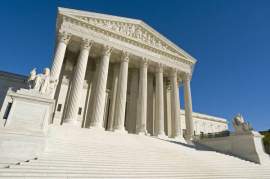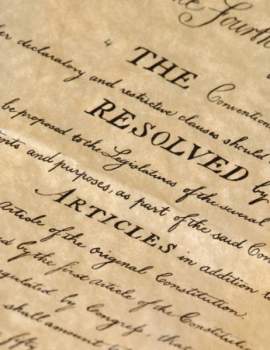
Major Decisions-Employment Division v. Smith

Popular In Constitution
Purpose Of Lifetime Appointment And Pros And Cons Enumerated Powers Bicameral Legislature Background Article 3 Of The Constitution We The People 1st Amendment Who Wrote The Constitution Judicial Review Equal Protection Clause 5th Amendment 10th Amendment Three Fifths Compromise
The Supreme Court case of Employment Division v. Smith was one that proved to be complex in its nature, for it had various concepts that had to be addressed in order to render a decision. Once again, the Supreme Court would be dealing with the application of the First Amendment rights.
In the Employment Division v. Smith, the specific matter at hand was whether or not an employer could deny unemployment benefits to a person that was fired for the use of a controlled substance (See Also: Controlled Substances) for religious reasons. Furthermore, the Court had to determine if such practice could be found to be in direct violation of First Amendment rights.
The Employment Division v. Smith case specifically
dealt with employees that were members of the Native American Church, which
normally practices the ingesting of peyote as a religious ceremony. These
employees were fired on the basis of being found in possession of peyote, which
is considered a criminal offense in the State of Oregon. The grounds of
possession was the main reason that these employees were denied unemployment
benefits, which would cause the matter to be brought to the courts.
The State
courts of Oregon would eventually reverse the prohibition of unemployment
benefits on the basis that the use of peyote was protected under the First
Amendment's freedom of religion. The State would appeal to the United States
Supreme Court, still holding the argument that such denial was proper due to
the possession and use of peyote being a crime.
The Supreme Court, upon examining the case, would
return the matter back to Oregon courts. The reasoning was that the State would
have to conclude on its own accord if the use of illegal drugs for religious
reasons would be in violation of the State's own drug statutes. Oregon State
would find that even though the consumption of illegal drugs for religious
reasons was considered illegal, such ruling would also violate the First
Amendment.
However, the key factor behind the Oregon law was that it was not implemented with the purpose of singling out the Native American practice of ingesting peyote for religious purposes, but rather it applied to all residents of the State. On this basis, the Supreme Court, with Chief Justice William Rehnquist presiding, would rule in favor of the State and not of Smith.
It would be the first time that the Supreme Court would rule against a person citing freedom of religion violations in United States history. The main reasoning behind the decision of the Supreme Court was that it was concluded that Smith and the other employees were using their religious beliefs and First Amendment rights as way to circumvent applicable laws regarding the use of illicit drugs or controlled substances. Furthermore, the Court also stated that such breach of the freedom of religion was not caused as a direct effect of a law, but rather a circumstantial happenstance. These laws were also not directed to prohibit the free exercise of religion to any particular religious sect, but rather intended to apply to the general public.
For this
reason, the Supreme Court decided that no First Amendment violation had
occurred. To further support the decision, the Supreme Court also cited that
the exemption to permit the religious use of a drug, peyote in this particular
case, is Constitutionally-permissible, but not Constitutionally-required.
Even though this would prove to be the first time
in which the freedom of religion clause was not upheld by the Supreme Court, it
would not undermine the Constitutional provision. However, it did provide for a
more succinct relationship between that of religion and Government. Even
though, in this particular case, it may be deemed that the Government
interfered with religious practice, it did so in a sense that was inadvertent
and as a contingency to an issue over which the Government does have control,
the use of illegal drugs.
NEXT: Major Decisions-Gibbons v. Ogden





















